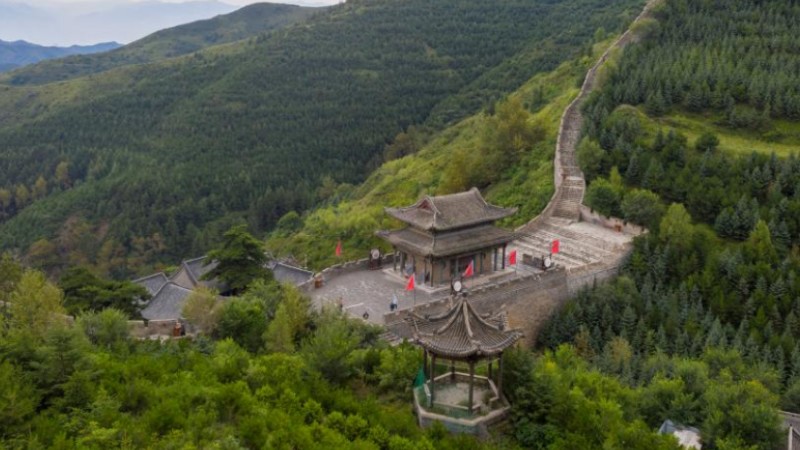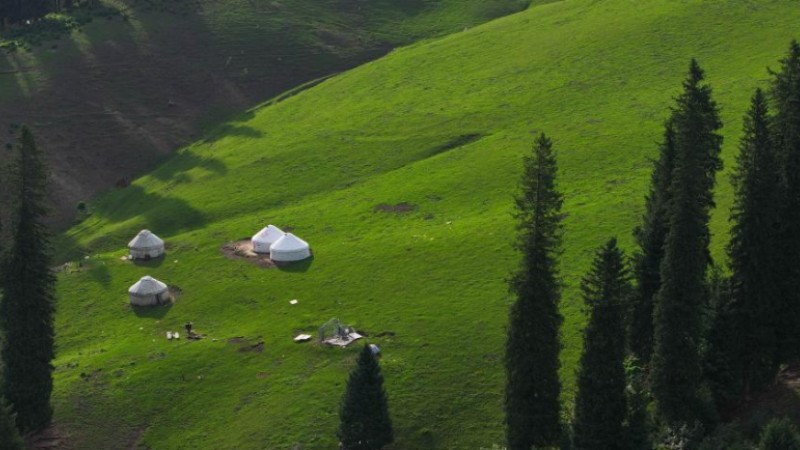Experts share views on the BRICS Summit

SHI YU/CHINA DAILY
Editor's note: Many have said that the just-concluded BRICS Summit in Johannesburg can be compared with the Bandung Conference because, like the meeting between Asian and African countries in 1955, it brought together developing countries to build a fair, just and equitable world order. Three experts share their views on the issue with China Daily.
Expansion shows importance of BRICS
By Francisco José Leandro
Goldman Sachs estimates that Asia's GDP in 2050 will reach $90.6 trillion (except developing markets) and the total global GDP will be $227.9 trillion. Similarly, the International Monetary Fund's World Economic Outlook estimates that in 2028, the BRICS countries' GDP(in terms of purchasing power parity) will account for 33.65 percent of global GDP, with the G7 countries' GDP declining to 27.77 percent. It seems the future will be driven by Asia's economic development, and in five years, BRICS will become a leading economic force.
Amid all these forecasts, the just-concluded BRICS Summit in Johannesburg announced the inclusion of six new members in the grouping. What should the international community read from these developments?
To begin with, the international community has recognized the importance of BRICS. The BRICS mechanism began with the meeting of the BRIC(Brazil, Russia, India and China) ministers of foreign affairs on the sidelines of the UN General Assembly in 2006. In 2009, it was upgraded to summit level to be held once a year. And in April 2011, South Africa participated as a full member for the first time in the BRICS Summit in Sanya, Hainan province, which changed BRIC into "BRICS". In 2014, the BRICS countries established the New Development Bank and the Contingent Reserve Arrangement.
Besides, the 2022 BRICS Summit, chaired by China and held via video link, put the fight against poverty and the pursuit of sustainable development at the center of South-South cooperation in the context of the United Nations' Sustainable Development Goals.
This sequence of events, culminating in the accession of Argentina, Egypt, Ethiopia, Iran, Saudi Arabia and the United Arab Emirates, shows the consistency, sense of purpose and political commitment of the grouping.
Second, BRICS is seeking a new equilibrium. According to a BRICS Trade and Investment Working Group report in 2022, BRICS is the world's most important economic bloc, accounting for more than one quarter of global GDP and 42 percent of the world's population. Last year, BRICS accounted for 23 percent of the global economic flows, 18 percent of global trade in goods and 25 percent in foreign investment, with its GDP (PPP) surpassing that of the G7.
The NDB and CRA support a number of projects including renewable energy projects in Brazil, railway network upgrade programs in India and new toll roads in Russia. The NDB has approved more than 80 projects and disbursed about $30 billion in loans.
Since the NDB does not impose harsh conditions while providing infrastructure financing for the member states and other developing countries and has been operating as a complement to the Bretton Woods financial institutions, it could help BRICS to have a bigger say in global financial governance.
BRICS has been working on sectoral cooperation in many areas including science and technology, trade, banking, investment, energy, agriculture and healthcare, as well as the fight against transnational crime. As part of sectoral cooperation, Brazilian President Luiz Inacio Lula da Silva proposed in Johannesburg that BRICS create a "common currency" to settle trade deals among the member states. This means the BRICS countries will intensify its de-dollarization efforts by, for instance, promoting the use of their own or other currencies in bilateral and multilateral trade, in order to end the US dollar's hegemony.
Addressing the Johannesburg summit, President Xi Jinping pointed out the new areas of cooperation, which include the digital economy, the green economy, supply chains, artificial intelligence, education, and cultural and people-to-people exchanges.
True, the developed countries still dominate the global governance mechanism for some years, but BRICS has made the world realize that the voice of developing countries can no longer be ignored. And the expansion of BRICS will help its member states to seek a new equilibrium, particularly in the global financial architecture.
And third, BRICS represents inclusive multilateralism. The five BRICS members are dispersed geographically, as would be the 11 members from 2024, when the six new members will become full members. To be sure, the member states are in different stages of development and have different political systems.
But despite the differences, BRICS has opened the door to six new members. BRICS is committed to promoting new possibilities and adopting innovative approaches to resolve knotty issues.
BRICS is asserting a new level of political and economic influence in ways that have caught many skeptics off guard. The BRICS countries are walking together on a mutually beneficial path to build an alternative mechanism to the Bretton Woods organizations — the IMF and the World Bank, and at the same time push for reforms at the IMF, the World Bank and the World Trade Organization.
As President Xi said in his address to the Johannesburg summit, "We need to act on the BRICS spirit of openness, inclusiveness and win-win cooperation to bring more countries into the BRICS family, so as to pool our wisdom and strength to make global governance more just and equitable."
The author is an associate professor at the University of Macau, China. The views don't necessarily reflect those of China Daily.
Why the six nations were chosen to join the grouping
By Hisham AbuBakr Metwally Mohamed
With the inclusion of Argentina, Egypt, Ethiopia, Iran, Saudi Arabia and the United Arab Emirates at its just concluded summit in Johannesburg, BRICS has become an 11-member grouping, though the six countries will become full members on Jan 1, 2024.
What led BRICS to choose these countries, not others, as new members given that 23 countries had formally applied to join the grouping?
In order to understand the main reasons behind accepting the six countries' application for membership, we have to understand the important goals of BRICS. "BRIC" was established in 2006 with Brazil, Russia, India and China as the four members. It became "BRICS" in 2010 with the inclusion of South Africa (though it participated in a BRICS Summit as a full member in 2011). The aim of BRICS has always been to promote trade and investment cooperation among its member states. In line with its development policy, BRICS established the New Development Bank in 2014 which has already funded a number of projects worth $30 billion.
The world has witnessed major political changes over the past few years. Many countries, especially developing and emerging market economies, have been trying to change the existing unipolar world order and reduce the control of rich countries over global financial institutions.
The world has seen the devastating effects of the trade war previous US president Donald Trump launched against other countries, particularly China, on developing economies as well as the global economy. Incumbent US President Joe Biden, instead of abandoning Trump's policies, has continued to use them to target China. In fact, the United States uses the dollar as a weapon against Russia, and imposed unilateral sanctions on that country, and has rallied its allies to follow in its footsteps. To be sure, the US-led Western control over international financial institutions such as the International Monetary Fund and the World Bank has harmed developing economies.
This US-centric system is no longer acceptable to the emerging market and developing economies. With developing countries as its representative, the Global South now wants to hold dialogue with developed economies to help build a multipolar world that is marked by equality and respect for the rules, and to restructure the global financial system.
According to World Bank data, the six new member states will add $3.24 trillion to the BRICS economies. As an indicator of the economic might of the grouping, the BRICS countries, even before the inclusion of the six new members, accounted for a larger share of global GDP (in purchasing power parity terms) than the G7 countries. To be precise currently BRICS accounts for 31.5 percent of the global GDP (PPP) while the G7 accounts for 30.7 percent. Plus, the BRICS countries are home to 3.2 billion people while the G7 countries have a population of just 800 million.
The question, "why were the six countries included in BRICS", was partly answered by Russian Foreign Minister Sergei Lavrov when he said at the Johannesburg summit that the criteria included the weight and prestige of the new members and their political stances on global issues, because all existing BRICS members agree the grouping should be expanded with the inclusion of countries with the same ideas.
As President Xi Jinping said, the expansion of BRICS will inject new impetus into the grouping's cooperation mechanism and reflects its determination to promote unity and cooperation.
Commenting on so many countries submitting applications to join BRICS, Brazilian President Luiz Inacio Lula da Silva said that their interest shows the developing world wants to establish a new global economic order that is fair, just, equitable and truly representational.
Other key factors, such as a diversified and strong economy, relatively developed infrastructure and strong local financial institutions, also played a role in the inclusion of the six countries in BRICS. But the fact that they are spread over three continents, too, was a key factor.
Saudi Arabia is the largest oil producer in the world and the largest Gulf economy, while the UAE is among the world's 10 largest oil producers and a global trade and aviation hub, and Iran is the fifth-largest oil producer in OPEC in 2021 and the third-largest gas producer in the world in 2020. Egypt is strategically important as it links Asia with Europe through the Suez Canal and is the second-largest economy in Africa, and Ethiopia is home to the headquarters of both the African Union and the United Nations Economic Commission for Africa. As for Argentina, it is the second-largest country and economy in South America.
The world is changing rapidly and the establishment of a multipolar world is no longer just a dream. With its expansion, BRICS is on the way to making it a reality.
The author is first economist researcher at the Egyptian Ministry of Foreign Trade and Industry. The views don't necessarily reflect those of China Daily.
Johannesburg summit a historic milestone in Global South unity
By Adnan Akfirat
The recently concluded BRICS Summit in Johannesburg took a significant step toward building a new international order in which developing and emerging market economies will determine the relationship framework.
Since developing countries are opposed to US hegemony, they are making efforts to build an egalitarian, just and development-based international order. At the BRICS Summit, the Global South crossed a critical threshold on the way to building institutions that will protect the interests of humankind as a whole.
With the inclusion of Argentina, Egypt, Ethiopia, Iran, Saudi Arabia and the United Arab Emirates in BRICS at the Johannesburg summit, the grouping now has 11 members. These six countries will become full-time members on Jan 1, 2024, though.
The Johannesburg summit will leave an indelible mark on history — similar to the one left by the meeting of Asian-African countries in Bandung, Indonesia, on April 18-24, 1955. The Bandung Conference became a symbol of the oppressed nations which had gained independence after the end of World War II to mobilize against imperialism and colonialism. In fact, many countries gained independence by following the "Bandung Spirit". The Bandung Conference brought together former colonies and poor countries to seek more representation in international institutions such as the United Nations.
That the Johannesburg summit was attended by representatives of 55 developing countries shows the Global South is on the way to building a fair, just and equitable world order. The developing countries are doing so because they are home to the majority of the global population and contribute more than the developed countries to the global economy, and therefore are determined to stop a handful of rich countries from trampling on the rights of the vast majority.
Although the leaders of all BRICS member states contributed to the successful summit, President Xi Jinping deserves the most credit for its success, as he has been committed to BRICS' development. As he said, "Development is not the prerogative of a few countries, but an inalienable right of all countries."
While South African President Cyril Ramaphosa did justice to his role as the host of the summit and raised hopes of Global South solidarity by inviting two African countries to join BRICS, Indian Prime Minister Narendra Modi and Brazilian President Luiz Inacio Lula De Silva played their due roles in promoting the BRICS' agenda.
That the United States is alarmed by the rise of the developing world was evident in the US National Security Advisor Jake Sullivan's announcement on Aug 22, the day the BRICS Summit began, that President Joe Biden will call for reforms at the G20 Summit in New Delhi next month to ensure the International Monetary Fund and the World Bank better serve the needs of developing countries.
"We have heard loud and clear that countries are asking us to step up our support in the face of the overlapping challenges they face," Sullivan told reporters. According to him, Biden will devote much of his energy at the G20 Summit to seek the reform of multilateral development banks such as the IMF and the World Bank.
The US knows that the IMF will become irrelevant if it continues to control it. The IMF and the World Bank, established as part of the Bretton Woods system, are instruments that a few developed countries have been using to protect their own interests and impose harsh conditions on developing countries.
Even UN Secretary-General Antonio Guterres has said that "the IMF's rules unfairly favor rich countries". Using an example to illustrate this fact, Guterres said: During the COVID-19 pandemic, the wealthy Group of Seven nations, with a population of 772 million, received equivalent of $280 billion from the IMF while the least-developed countries, with a population of 1.1 billion, were allotted just over $8 billion.
The G7 currently holds 41.25 percent of the votes in the IMF, which means the US and its allies have almost complete control over the IMF's decision-making. Developing countries have enough experience to realize that Biden's "promise to reform" the IMF and the World Bank is just another tactic to maintain the US' hegemony.
One of the greatest injustices in the world is that Africa — with 54 countries and 1.3 billion people — is not represented in the UN Security Council, although more than 60 percent of the issues discussed by the Security Council concerns Africa. African countries can participate in such discussions only as non-permanent members of the Security Council.
The Jophannesburg summit has created a path to correcting the injustice done to Africa and the African people for centuries. And BRICS will help the continent to seek justice in the new era.
The author is chairman of Turkish-Chinese Business Development and Friendship Association. The views don't necessarily reflect those of China Daily.
Photos
Related Stories
- Interview: BRICS' expansion helps ensure fairer world -- former Ethiopian diplomat
- Egypt sets up gov't unit to facilitate cooperation with BRICS countries
- BRICS Summit: Powering multilateral progress
- New BRICS members seek development opportunities, fairer world order
- Bigger BRICS "stronger and more important," says Brazil's Lula
- BRICS to play bigger role in improving global governance
- BRICS stands for a fairer world, says UK expert
- BRICS challenges Western hegemony with strategic expansion
- Highlights of Xi's trip to South Africa
- BRICS can redress global imbalances -- experts
Copyright © 2023 People's Daily Online. All Rights Reserved.









